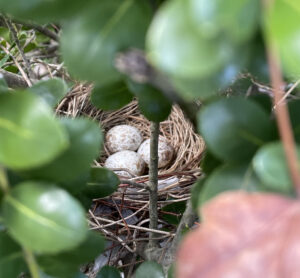“Philosophers call this state of isolation and disconnection “species loneliness”—a deep, unnamed sadness stemming from estrangement from the rest of Creation, from the loss of relationship. As our human dominance of the world has grown, we have become more isolated, more lonely...”
“...it is not enough to weep for our lost landscapes; we have to put our hands in the earth to make ourselves whole again. Even a wounded world is feeding us. Even a wounded world holds us, giving us moments of wonder and joy. I choose joy over despair. Not because I have my head in the sand, but because joy is what the earth gives me daily and I must return the gift.”
 As part of this month’s reflection on interdependence, on Sunday I offered some “Beatitudes” that I wrote for whales. I was inspired to do so by an assignment to “re-wild” the Beatitudes as part of an eco-spiritual leadership class I took over the last three months.
As part of this month’s reflection on interdependence, on Sunday I offered some “Beatitudes” that I wrote for whales. I was inspired to do so by an assignment to “re-wild” the Beatitudes as part of an eco-spiritual leadership class I took over the last three months.
After the sermon, I invited folks to take just a few moments to suggest a Beatitude of their own, to call attention to the overlooked and undervalued. I probably needed to give y’all more time to meditate and write! Below are those that folks passed to me. More are welcome; I’ll put the below on the white boards in Freeman Hall and invite new ones as we celebrate Earth Day this Sunday and reflect on our place- and our agency– as members of the interdependent web of life.
Beatitudes, April 2024, by members of North Parish
Blessed is the Gulf Stream upon which so much depends.
Blessed are the Marshall Islands, hit by rising seas and stronger typhoons.
Blessed are the shellfish who filter our oceans.
Blessed is the dune grass that protects the shoreline as it struggles to survive human development and rising seas.
Blessed are our lakes, ponds and streams that filter our water and support an astounding and miraculous web of life that we as humans are just beginning to grasp.
Blessed are the waterfowl who bring us joy and peace and a sense of beauty all year long. May they continue to be strong and survive the adversities they face.
Blessed be the birds and trees.
Blessed are our native trees, especially oaks, who help over 350 insect species pollinate our food and flowers.
Blessed are the deer family that wanders through our backyard and brings us joy and beauty.
Blessed are the bats who eat pests, pollinate plants, disperse seeds…and have dramatically decreased in number.
Blessed are the rats, the mice, the creepy bugs and all creatures that we detest. They offer humility and grace.
Blessed are the earthworms who transform our soil, feed spring birds and delight our kids.
Blessed are the caregivers who work for limited pay with great love and gentle touch.
Blessed are the kitties for they bring healing purrs, undying devotion and endless love.
Blessed are the discarded cats and dogs.
Blessed are all the oceans, landforms, waterways, plants, trees, insects, and creatures both wild and domesticated that inhabit our world.
Blessed be they, indeed.
Interdependently yours,
Rev. Lee
P.S. The Center for Biological Diversity and Defenders of Wildlife announced that on Wednesday of this week, 115 conservation groups urged Congress to increase the U.S. Fish and Wildlife Services budget from $329 million to $875 million. Hundreds of endangered animals and plants receive less than $1,000 from the Federal government for their recovery in a typical year and several hundred receive no funding at all. For perspective, last year Americans spent $700 million on pet Halloween costumes alone. This is why I think we need Animal Beatitudes (and pro-all-animal-life evangelism) in every religious congregation in this nation. Both the Center and Defenders are asking for donations in honor of Earth Day.
Stephanie Kurose, government affairs deputy director at Center for Biological Diversity wrote, “It’s gut-wrenching to watch our natural world collapse and our most imperiled animals and plants decline knowing Congress could stop the extinction crisis if it just mustered the political will. Fully funding our most successful conservation law is a small price to pay for saving the earth.”
